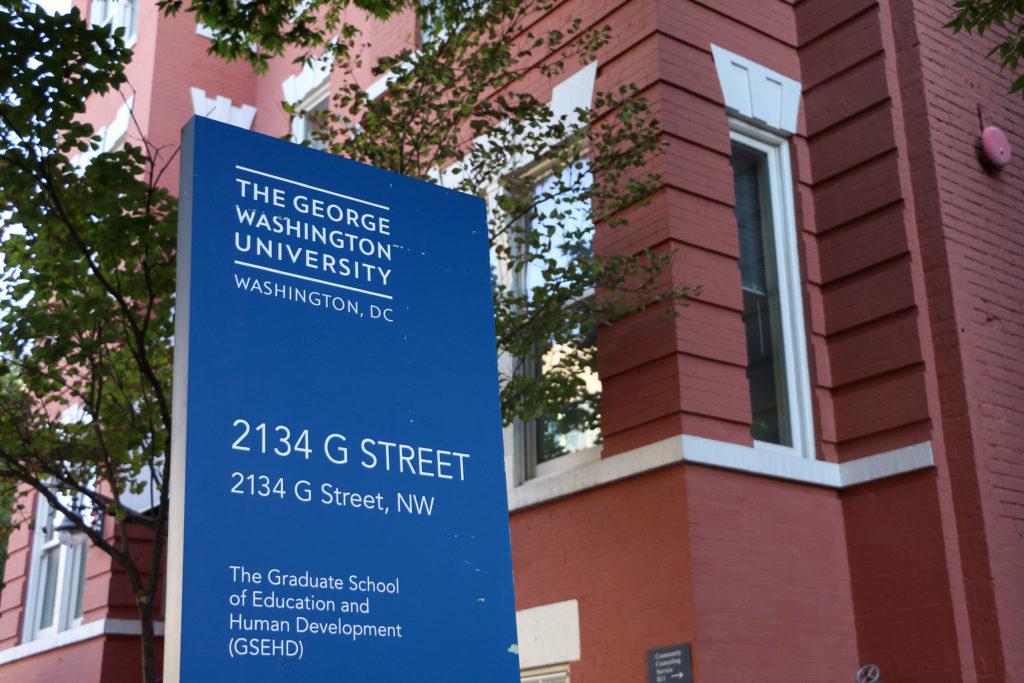Students can now earn a master’s degree with a focus on Jewish education.
The Mayberg Center for Jewish Education and Leadership in the Graduate School of Education and Human Development will debut a two-year master’s program this summer called Curriculum and Instruction with a concentration in Jewish education. Faculty said the 30-credit master’s degree fills a need in the D.C. region to educate professionals about Jewish teaching.
Sharon Blumenthal-Cohen, the associate program director, said students are required to take core courses from the already-existing Curriculum and Instruction master’s program in GSEHD, which include topics like quantitative research and teacher leadership. Students will also take more specific courses on subjects like Jewish history, the Bible and rabbinics, she said.
“What we’ve done with the program is that we’ve combined the core courses of Curriculum and Instruction, which are not focused on any particular kind of school setting, with the courses in Jewish education, and so, by doing that, by the end of the program the candidates are really open to teaching in a variety of educational settings,” she said.
Blumenthal-Cohen said she is marketing the program to potential students by visiting Jewish schools and educational communities in the D.C. region to establish the program’s first student cohort. She said the program has a target number of about 10 students and it will not have an enrollment cap for summer 2019.
“We are presenting this program as a cohort experience, and so we want students to be able to connect with each other and build a community of scholarship together and support each other through their work in the program,” Blumenthal-Cohen said.
She said students will complete a 10-week internship and practicum as part of the program, which she said will place students in “real-life” settings to hone their skills teaching Jewish-related topics.
“Essentially, it is a degree for folks who are either presently working in Jewish educational settings or individuals who want to start to work in settings, and we’re talking about K-12, and have very rich content knowledge but are lacking the training on how to teach that knowledge,” she said.
She said she has heard from D.C. professionals who specialize in the Jewish education community that there is a need in the Jewish instructional setting for more teacher training, and “we’re responding to that need.”
Blumenthal-Cohen added that GW is the only local non-religious university to offer a Jewish education specialized degree. The school already offers the master’s program in experiential education and Jewish cultural arts, which prepares students to work in Jewish museums, art institutions and synagogues.
“The broader Jewish educational community has a lot of faith in the content knowledge of its teaching professionals and wants to enhance the ways in which students are taught and we’re responding to that need,” she said.
Erica Brown, the director of the master’s program, said the program was developed to fill both the regional and the national need for Jewish educators.
“The degree prepares you to teach in Jewish settings but equally in general education settings, so I think that it’s appropriate for a student who wants to be mission-driven in their career and education,” she said.
Brown said the program offers courses on topics like Jewish history and the Bible, which she said can help students hone their skills in Jewish education.
“We’re looking for students who want a mission-focused career and see themselves wanting to contribute to the landscape of education,” she said. “We want to give people an opportunity to be in the nation’s capital and in a place where a lot of leadership decisions get made.”
Benjamin Jacobs, a visiting associate professor of experiential education and Jewish cultural arts, said that even a specialized program focused on Jewish education encompasses a wide range of learners, educators and subject areas.
“It is a robust field that, like all professional fields in education and human development, requires excellent educators well-prepared in the aims, contents, and methods of their craft,” he said.
He said creating a graduate program in D.C. focused on Jewish education and studies contributes to having “excellent” Jewish educators that can advance the field of Jewish education.
“Educators at GSEHD preparing for all types of settings can learn from the unique opportunities and challenges that face Jewish educators, such as pluralistic learning, experiential education in informal settings like cultural institutions and much more,” he said.
Dani Grace and Zoya Wazir contributed reporting.




